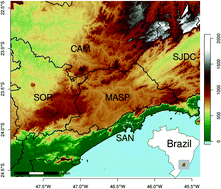Atmospheric effects of air pollution during dry and wet periods in São Paulo†
Abstract
Air pollutants reach high concentrations in developing countries, such as Brazil. The state of São Paulo is the economic and demographic center of Brazil and presents high levels of urbanization, fleet, and air pollution. Air pollutant concentrations are driven by meteorology, but aerosols present in polluted air also interact and change meteorological parameters due to their primary and secondary feedback effects. The objective of this study is to evaluate the impact of on-road transportation emissions on air pollutant concentrations and meteorology. Vehicular emissions were estimated using the VEIN model with a bottom-up fuel-calibration approach, and air pollutant concentrations were simulated using the WRF-Chem model considering dry and wet periods for Southeast Brazil. A 3 km grid spacing was considered for the inner domain to account for mesoscale circulation. Air pollutant simulations aligned with observations. Regarding the aerosol feedback, stronger interactions were found during the wet period. It was found that the effect of aerosols reduces 1.3% of downward solar radiation and 1.5% of O3, during the dry period. Furthermore, indirect effects of aerosols resulted in more precipitation, a higher planetary boundary layer, and lower levels of air pollutants in cities.



 Please wait while we load your content...
Please wait while we load your content...